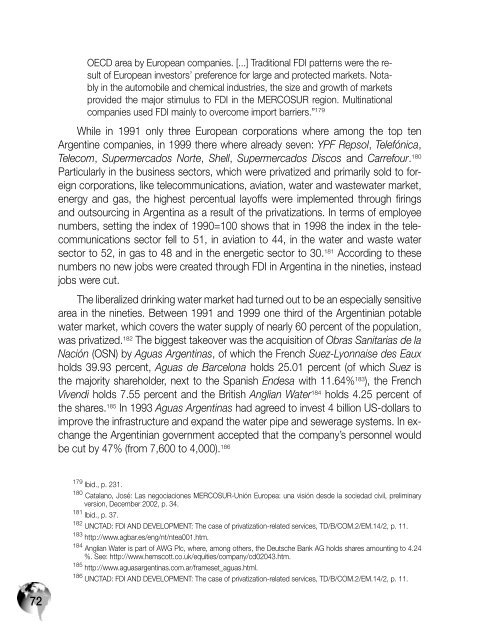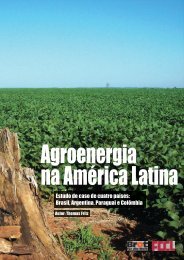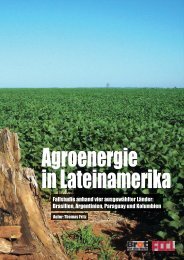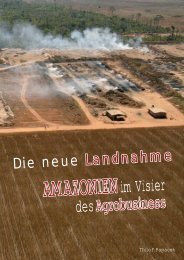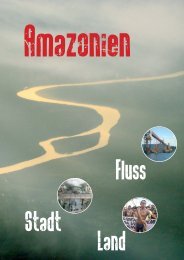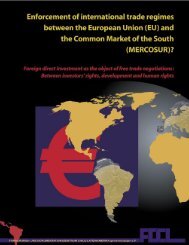Download - FDCL
Download - FDCL
Download - FDCL
You also want an ePaper? Increase the reach of your titles
YUMPU automatically turns print PDFs into web optimized ePapers that Google loves.
72<br />
OECD area by European companies. [...] Traditional FDI patterns were the result<br />
of European investors’ preference for large and protected markets. Notably<br />
in the automobile and chemical industries, the size and growth of markets<br />
provided the major stimulus to FDI in the MERCOSUR region. Multinational<br />
companies used FDI mainly to overcome import barriers.” 179<br />
While in 1991 only three European corporations where among the top ten<br />
Argentine companies, in 1999 there where already seven: YPF Repsol, Telefónica,<br />
Telecom, Supermercados Norte, Shell, Supermercados Discos and Carrefour. 180<br />
Particularly in the business sectors, which were privatized and primarily sold to foreign<br />
corporations, like telecommunications, aviation, water and wastewater market,<br />
energy and gas, the highest percentual layoffs were implemented through firings<br />
and outsourcing in Argentina as a result of the privatizations. In terms of employee<br />
numbers, setting the index of 1990=100 shows that in 1998 the index in the telecommunications<br />
sector fell to 51, in aviation to 44, in the water and waste water<br />
sector to 52, in gas to 48 and in the energetic sector to 30. 181 According to these<br />
numbers no new jobs were created through FDI in Argentina in the nineties, instead<br />
jobs were cut.<br />
The liberalized drinking water market had turned out to be an especially sensitive<br />
area in the nineties. Between 1991 and 1999 one third of the Argentinian potable<br />
water market, which covers the water supply of nearly 60 percent of the population,<br />
was privatized. 182 The biggest takeover was the acquisition of Obras Sanitarias de la<br />
Nación (OSN) by Aguas Argentinas, of which the French Suez-Lyonnaise des Eaux<br />
holds 39.93 percent, Aguas de Barcelona holds 25.01 percent (of which Suez is<br />
the majority shareholder, next to the Spanish Endesa with 11.64% 183 ), the French<br />
Vivendi holds 7.55 percent and the British Anglian Water 184 holds 4.25 percent of<br />
the shares. 185 In 1993 Aguas Argentinas had agreed to invest 4 billion US-dollars to<br />
improve the infrastructure and expand the water pipe and sewerage systems. In exchange<br />
the Argentinian government accepted that the company’s personnel would<br />
be cut by 47% (from 7,600 to 4,000). 186<br />
179<br />
Ibid., p. 231.<br />
180<br />
Catalano, José: Las negociaciones MERCOSUR-Unión Europea: una visión desde la sociedad civil, preliminary<br />
version, December 2002, p. 34.<br />
181<br />
Ibid., p. 37.<br />
182<br />
UNCTAD: FDI AND DEVELOPMENT: The case of privatization-related services, TD/B/COM.2/EM.14/2, p. 11.<br />
183<br />
http://www.agbar.es/eng/nt/ntea001.htm.<br />
184<br />
Anglian Water is part of AWG Plc, where, among others, the Deutsche Bank AG holds shares amounting to 4.24<br />
%. See: http://www.hemscott.co.uk/equities/company/cd02043.htm.<br />
185<br />
http://www.aguasargentinas.com.ar/frameset_aguas.html.<br />
186<br />
UNCTAD: FDI AND DEVELOPMENT: The case of privatization-related services, TD/B/COM.2/EM.14/2, p. 11.


